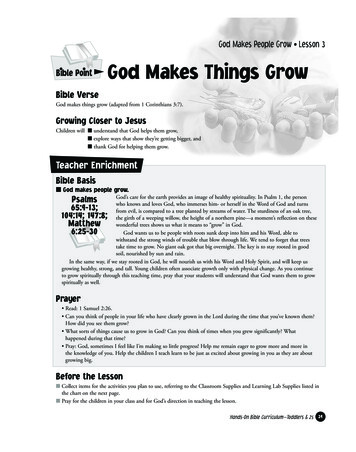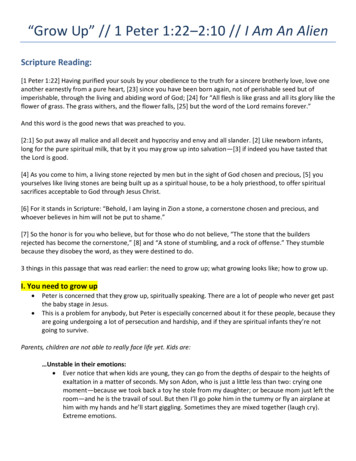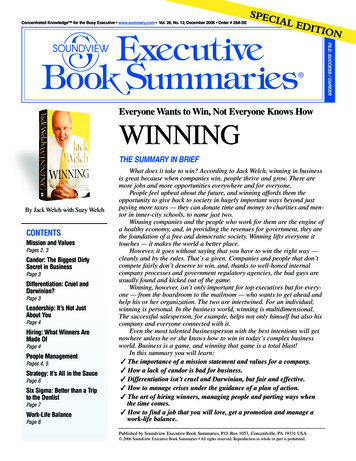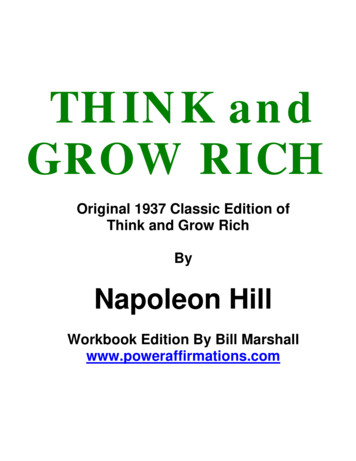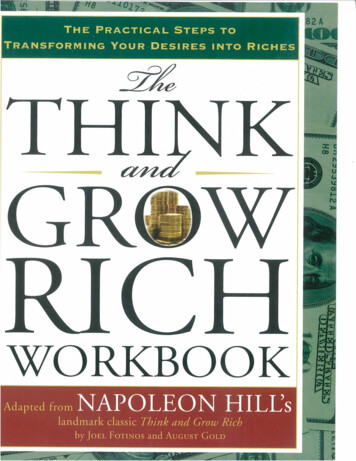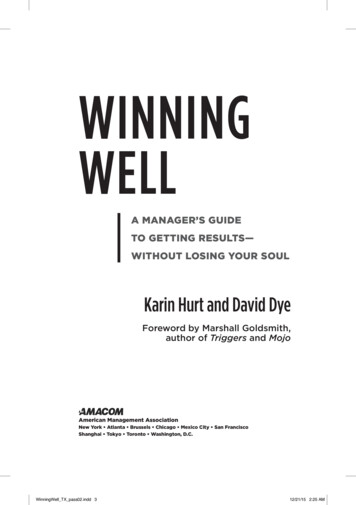
Transcription
WINNINGWELLA MANAGER’S GUIDETO GETTING RESULTS—WITHOUT LOSING YOUR SOULKarin Hurt and David DyeForeword by Marshall Goldsmith,author of Triggers and MojoAmerican Management AssociationNew York Atlanta Brussels Chicago Mexico City San FranciscoShanghai Tokyo Toronto Washington, D.C.WinningWell TX pass02.indd 312/21/15 2:25 AM
Bulk discounts available. For details visit:www.amacombooks.org/go/specialsalesOr contact special sales:Phone: 800-250-5308Email: specialsls@amanet.orgView all the AMACOM titles at: www.amacombooks.orgAmerican Management Association: www.amanet.orgThis publication is designed to provide accurate and authoritative information inregard to the subject matter covered. It is sold with the understanding that thepublisher is not engaged in rendering legal, accounting, or other professionalservice. If legal advice or other expert assistance is required, the services of acompetent professional person should be sought.Net Promoter Score is a registered trademark of Fred Reichheld, Bain & CompanyDiaper Genie is a registered trademark of Playtex Products, Inc.LIBRARY OF CONGRESS CATALOGING-IN-PUBLICATION DATANames: Hurt, Karin, author.Title: Winning well: a manager’s guide to getting results—without losing yoursoul/Karin Hurt and David Dye; foreword by Marshall Goldsmith.Description: New York: American Management Association, [2016] Includesindex.Identifiers: LCCN 2015045507 (print) LCCN 2015047288 (ebook) ISBN9780814437254 (hardcover) ISBN 9780814437261 (ebook)Subjects: LCSH: Executive ability. Management. Performance. Leadership.Classificiation: LCC HD38.2.H87 2016 (print) LCC HD38.2 (ebook) DDC658.4/09—dc23LC record available at http://lccn.loc.gov/2015045507 2016 Karin Hurt and David DyeAll rights reserved.Printed in the United States of America.This publication may not be reproduced, stored in a retrieval system, ortransmitted in whole or in part, in any form or by any means, electronic,mechanical, photocopying, recording, or otherwise, without the prior writtenpermission of AMACOM, a division of American Management Association, 1601Broadway, New York, NY 10019.The scanning, uploading, or distribution of this book via the Internet or anyother means without the express permission of the publisher is illegal andpunishable by law. Please purchase only authorized electronic editions of thiswork and do not participate in or encourage piracy of copyrighted materials,electronically or otherwise. Your support of the authors’ rights is appreciated.About AMAAmerican Management Association (www.amanet.org) is a world leader in talentdevelopment, advancing the skills of individuals to drive business success. Ourmission is to support the goals of individuals and organizations through acomplete range of products and services, including classroom and virtualseminars, webcasts, webinars, podcasts, conferences, corporate and governmentsolutions, business books, and research. AMA’s approach to improvingperformance combines experiential learning—learning through doing—withopportunities for ongoing professional growth at every step of one’s careerjourney.Printing number10 9 8 7 6 5 4 3 2 1WinningWell TX pass02.indd 412/21/15 2:25 AM
To my parents, Larry and Jean,my first and best examples of winning well.And to Ben and Sebastianon our shared journey toward what’s possible.—KarinTo my daughter, Averie,for showing me what it means to win well.—DavidWinningWell TX pass02.indd 512/21/15 2:25 AM
ContentsFOREWORDixSECTION 1The World of Winning WellCHAPTER 1Winning Well3CHAPTER 2How to Win Well in Every Situation9CHAPTER 3Master the Metrics Maze28SECTION 2Winning—Achieve Results, Get Things Done, and Move to the TopCHAPTER 4How to Keep Your People Focused on ResultsLead Meetings That Get Results and That PeopleWant to AttendCHAPTER 5CHAPTER 6Get BehindHow to Make Business Decisions Your People394656CHAPTER 7 How to Hold Your People Accountable WithoutLosing Your Soul62How to Solve the Right Problem Quickly and GetBack to Work71CHAPTER 8viiWinningWell TX pass02.indd 712/21/15 2:25 AM
CHAPTER 9How to Delegate So Nothing Falls Through the CracksCHAPTER 10Get More Done in Less TimeCHAPTER 11 How and Why to Terminate Employees withGrace and Dignity829098SECTION 3Winning Well—Motivate, Inspire, and Energize Your TeamCHAPTER 12The Secret to Releasing Your People’s EnergyCHAPTER 13How to Create Confidence and Momentum118CHAPTER 14Build a Loyal Team of Problem Solvers128CHAPTER 15Inspire Your Team to Double Productivity140CHAPTER 16Get the Feedback You Need and the InfluenceCHAPTER 17Energize Your Team and Ensure That They Own theCHAPTER 18A Powerful Prescription for Energy- and Soul-LossCHAPTER 19Great Relationships Require Great Results180CHAPTER 20Sustain Your Team’s Energy and Momentum191You CraveResultsPreventionCHAPTER 21InfluenceEssential Practices That Build Your Credibility and109148160170203SECTION 4It’s Time to Win WellWhat If My Boss Doesn’t Want to Win and Doesn’tCare About Their Soul or Mine?CHAPTER 22217CHAPTER 23What If My Team Doesn’t Want to Win?226CHAPTER 24How to Inspire and Motivate Yourself234CHAPTER 25Your Winning Well Legacy244INDEXWinningWell TX pass02.indd 824912/21/15 2:25 AM
ForewordI’ve made a career out of helping business leaders develop betterrelationships with their colleagues and team. In the course of thatwork, I’ve seen many managers who struggle to achieve businesssuccess, much less build meaningful professional relationships.If that’s you, you’re not alone. The truth is that in companies,nonprofits, and government offices around the world, it’s not hardto find stressed-out, frustrated (and often helpless) managers. But itdoesn’t have to be this way. Not for you.Karin Hurt and David Dye give you the tools you need to take ona manager’s most important job: to improve business performance,without sacrificing your humanity, your well-being, or your sanity.I often share with executives that the only performanceappraisal that really matters is the one you give yourself as you lookback over your life. When friends of mine interviewed people in thelast years of their life, three themes emerged: be happy now, friendsand family are critically important, and if you have a dream, go for it.From a business perspective, my ultimate business advice isn’tvery different: Life is short—have fun. Do whatever you can to help people. Do what you think is right.Karin and David give you the specific tools to accomplish allthree of these goals in your daily work. The resources they share willhelp you create a healthy management mindset, improve businessixWinningWell TX pass02.indd 912/21/15 2:25 AM
xForewordperformance with less stress, and help you build better relationships with your colleagues and team. I encourage you to use thesetools, not just because they will improve your business performancebut also because at the end of your life, you will be happy that youdid.As an executive coach, I’m fond of simple tools. Yet simpledoesn’t mean easy. The tools Karin and David share with you arestraightforward and simple to implement, but they will work onlywhen you use them. Karin and David know they work becausethey’ve been where you are now, and they’ve practiced everythingthey give you.One thing that sets Karin and David apart from other businessauthors is their compassion. They genuinely know what it’s like todo the work you do, face the pressures you do, and thrive amid them.They have genuine compassion for frontline and middle-level managers that comes through in the encouragement, humor, and toughlove they share. They want you to succeed.Ultimately, your work as a manager is about far more than whatyou make or how you serve your customers. In the final chapter,Karin and David call us to our legacy: the life you build for yourself,your family, and the impact you have on the people around youwhile you do your work. In Winning Well, Karin and David give youthe answers you need to do just that. Will you use them?Life is good.MARSHALL GOLDSMITH,AUT HOR O F TRIGGERS AND MOJOWinningWell TX pass02.indd 1012/21/15 2:25 AM
WINNINGWELLWinningWell TX pass02.indd 1112/21/15 2:25 AM
SECTION 1The World ofWinning WellWelcome to a new way to manage: the world of Winning Well.Throughout this book we give you the tools to thrive, achievelasting business results, and enjoy your work. In this section weintroduce the very real challenges that confront every manager, explain what exactly we mean by Winning Well, and giveyou the fundamental principles you can use to succeed in everymanagement scenario you encounter. You’ll also meet threetypes of managers who either aren’t winning or are winningpoorly and losing their soul in the process. Finally, we’ll sharehow to manage effectively in the age of constant data. Thesetools are your foundation to win well and get results withoutlosing your soul.WinningWell TX pass02.indd 112/21/15 2:25 AM
CHAPTER 1Winning Well“Life is either a daring adventure or nothing at all.”—HELE N KE LLE RToo often, managers try to win at all costs, when they should befocused on Winning Well. The hypercompetitive postrecessionglobal economy puts frontline and middle-level managers in a difficult position—expected to win, to “move the needle,” to get the highest ratings, rankings, and results. Many managers become hell-benton winning no matter what it takes, and they treat people likeobjects—in short, they lose their soul.This exacts a high price from managers as they work longerhours to try to keep up. Those unwilling to make this trade-off eitherleave for a less-competitive environment or try to stave off the performance demands by “being nice” to their team. After years of trying to win while sandwiched between the employees who do theheavy lifting and leaders above them piling on more, they give upand try to get along. Inevitably, after prolonged stress and decliningperformance, they surrender to apathy, disengage, or get fired.Don’t think this is happening where you work? Research saysotherwise. According to Gallup, nearly two-thirds of Americanworkers and managers are disengaged.1 We don’t believe that’s acoincidence. No one wins in environments like that.3WinningWell TX pass02.indd 312/21/15 2:25 AM
4THE WORLD OF WINNING WELL “You can’t be in last place!” Joe shouted, and immediately winced ashe saw Ann’s exhausted eyes begin to tear up.Later in his office, Joe admitted: “She didn’t deserve that. She’s anewly promoted center director working long hours in a fast rampup. The problem is, we’re out of time. The business plan called forthis center to be profitable in six months, and it’s been over a year,and we’re not even close. My VP keeps calling for updates every fewhours, and that just wastes everyone’s time.”Joe squeezed his temples. “My people need me to coach andsupport them, but if we don’t improve in the next 90 days, none of uswill be here next year. Maybe I need to go.”Joe leads a 600-person call center. The company stack ranksemployees, meaning that every representative is assessed on a balanced scorecard of quality, productivity, and financials and ranked inorder from highest to lowest. The managers and centers are ranked inthe same way, and Joe’s center is dead last. The vice president of operations keeps a close eye on those numbers and constantly calls Joe toask what he’s doing about the ranking. Joe spends most of his timeputting out fires, answering customer complaints, and crunchingnumbers in a desperate attempt to move his team up the stack rank.Whether your organization stack ranks or not, can you identifywith Joe’s frustration? He’s been asked to win a game that feelsrigged. He can’t possibly do everything he needs to. The companykeeps score, and Joe is losing. Every time he tries to win, he ends uphurting people—people he knows are trying as hard as he is.At this point, he’s not sure he can win, but if he can, it seems thatvictory will cost him dearly. He can feel his soul slipping away everytime he loses his temper. It gets results—but at what cost?WINNINGWinning doesn’t mean you reach some imaginary state of perfection. Winning means that you and your people succeed at doingwhat you’re there to do. The real competition isn’t the departmentWinningWell TX pass02.indd 412/21/15 2:25 AM
Winning Well5across the building or the organization across town. Your competition is mediocrity.Whether you manage a group of engineers with a governmentcontract to build the next interplanetary satellite, or you supervisea nonprofit team working to save an endangered shrew, or you manage a team of property tax assessors in a large city, or you’re a surgeon working with an anesthesiologist and operating room nursesyou’ve never met before to save a patient’s life, or you manage a24-hour convenience store, winning means you achieve excellence.When you win, we have better customer service, better products,better care, better experiences, and a better world. When you win,life is better for everyone.WINNING WELLWinning Well means that you sustain excellent performance overtime, because you refuse to succumb to harsh, stress-inducingshortcuts that temporarily scare people into “performing.” Youneed energized, motivated people all working together. Your strategy is only as strong as the ability of your people to execute at thefront line, and if they’re too scared or tired to think, they won’t. Youcan have all the great plans, six sigma quality programs, and brilliantcompetitive positioning in the universe, but if the human beingsdoing the real work lack the competence, confidence, and creativityto pull it off, you’re finished.In fact, in today’s connected world, people increasingly expect apositive work environment. When you don’t provide it, they caneasily go across the street to your competitor or go into business forthemselves as freelancers or independent contractors. Now everyone else but you benefits from the time and training you invested.Winning Well means that you sustain excellentperformance over time.WinningWell TX pass02.indd 512/21/15 2:25 AM
6THE WORLD OF WINNING WELLThe stories and best practices in this book come from our experience working with thousands of managers across private, public,and nonprofit industries who have something in common: Theymust motivate their people to achieve results that often feel impossible. Winning Well doesn’t mean you’ll be a pushover. It meansyou’ll be a manager known for getting results, whom people respect,and whom people want to work with. You can win—and you can winwithout losing your soul.HOW TO USE THIS BOOKIn Winning Well, we share proven, practical tools you can use toinspire your people and achieve excellent results over time. Theseare the same tools we used in our own careers and we share with allthe managers we train and coach. This isn’t a book about management theory; we give you enough context so you can understandwhy something works and how to adapt it for your needs, but ourgoal is to give you resources you can use right away not just to win—but to win well.Winning Well is written so you can quickly find the answersyou need. We recommend that you read it through and answer theaction plan questions at the end of each chapter. You can also usethe book as a real-world reference guide for challenges you face.Have a team member who feels left out or needs more challenge?Turn to Chapter 17 or Chapter 19 and solve your problem. Do delegated tasks slip through your fingers? Check out Chapter 9. Ifyou’re looking for a quick activity to energize your team or buildbetter relationships, flip through Section 3 and you’ll find severalthat meet your needs.Every chapter includes real-life examples taken from our experiences or those of the many managers we’ve worked with. At theconclusion of every chapter is Your Winning Well Action Plan. Thequestions and activities in these sections are designed to help youapply what you’ve learned and see changes as soon as possible. Eachsection ends with a summary of the Winning Well practices essential to your success.WinningWell TX pass02.indd 612/21/15 2:25 AM
Winning Well7In the next chapter, we’ll share the management mindset that isthe core of Winning Well. You can take this model with you into anyscenario you’ll ever encounter and win well. Section 1 concludeswith recommendations on how to use data without letting it distract you from what’s ultimately important.In Section 2, Chapters 4 to 11, we give you tools that allow youto win—to achieve meaningful results. These are practical tips,techniques, and tactics you can apply immediately to addressperformance-related issues, including how to get your peoplefocused on results, how to make business decisions everyone getsbehind, and how to quickly hold your people accountable for commitments and results.In the third section of the book, Chapters 12 to 21 provide youthe keys to win well—to motivate, inspire, and energize your team.You will dive into the fundamental needs all employee have andexplore practical methods for supporting them in ways that sustainand improve results.In the final section, Chapters 22 to 25 address challenges you’llencounter on your Winning Well journey. Section 4 gives you specific ways to overcome bosses who don’t care if you win well, employees who don’t care if they win at all, and perhaps the most difficultchallenge—you.YO U R W INNING WELL ACTION PLANIn addition to the tools in the book, we’ve included a wealth of additional resources, appendixes, activities, and handouts in the Winning Well Tool Kit available online at www.WinningWellBook.com.We recommend you download the tool kit and keep it nearby as youread.WinningWell TX pass02.indd 712/21/15 2:25 AM
8THE WORLD OF WINNING WELLNOTES1.Nikki Blacksmith and Jim Harter, “Majority of American Workers NotEngaged in Their Jobs,” Gallup Poll, October 28, 2011, accessed October15, 2014, nWorkers-Not-Engaged-Jobs.aspx; “State of the American Manager:Analytics and Advice for Leaders,” Gallup report, October 28, 2011,accessed January 11, 2015, an-manager.aspx.2. Intuit’s research predicts that by 2020, 40 percent of the Americanworkforce will be freelancers. Intuit, “Intuit 2020 Report,” October2010, accessed April 3, 2015, tuit/futureofsmallbusiness/intuit 2020 report.pdf.WinningWell TX pass02.indd 812/21/15 2:25 AM
CHAPTER 2How to Win Well inEvery Situation“‘Think simple’ as my old master used to say—meaning reduce the whole of its parts into thesimplest terms, getting back to first principles.”—F RA NK L LOYD WRIGHTIn this chapter we share four foundational Winning Well principles: confidence, humility, results, and relationships. In theAction Plan at the end of this chapter you can complete a WinningWell assessment to identify areas where you already excel, andbehaviors that could use additional focus. “Don’t throw fish!”There aren’t many places you’d hear that sentence spoken—unless you spend time in children’s classrooms. Then, all bets areoff.David began his professional career as an educator. When you’retrained as a teacher, one of the most important professional skillsyou ever learn is how to manage your classroom. How do you createand maintain a safe learning environment and keep 30 (or more)9WinningWell TX pass02.indd 912/21/15 2:25 AM
10THE WORLD OF WINNING WELLstudents focused when many of them would rather be doing something else? How do you prevent misbehavior?Early in his teaching career, a mentor shared an important principle of classroom management. She called it the “Don’t throw fish”paradigm. When it comes to classroom management, inexperiencedteachers often default to a list of rules. You’ll remember these fromyour own classroom days: raise your hand to speak, keep your handsto yourself, and stay in line.But what do you do when a student does something that isn’tcovered by the rules? Say, for example, he throws a ball at a classmate. The inexperienced teacher says, “Don’t throw balls at people.”That’s when little Tommy, who ought to be a lawyer when hegrows up, grabs a goldfish out of the classroom aquarium and throwsit at Susie. The exasperated teacher yells, “Tommy, didn’t I tell younot to throw things at people?”Tommy, impish grin firmly in place, says, “You said don’t throwballs—you didn’t say anything about fish.”The point David’s mentor made is this: You’ll never have a specific rule for everything. It is far more useful to have a few simple,straightforward guidelines that apply all the time.We share many specific tools you can use in specific situationsand to achieve specific results, but we don’t address every situationyou’ll ever experience. We can do better. We can give you the Winning Well principles—the model and practices that will get youthrough any management or leadership situation you’ll ever face.When you master these, you’ll be ready for anything. In fact, all ofthe specific tools we give throughout the rest of the book are built onthese principles.THE FOUR PRINCIPLES OF WINNING WELLManagers who sustain results over time operate from four principles. Internally, they value confidence and humility. Externally,they build on this strong internal foundation with a combined focuson relationships and results. Let’s start with confidence, becauseyours will inspire others’ and make the other three principles easierWinningWell TX pass02.indd 1012/21/15 2:25 AM
How to Win Well in Every Situation11to enact. There are three critical components to managing with confidence: know your strengths, stand up for what matters, and speakthe truth.CONFIDENCE1. Know your strengths, own them, and use them.You don’t need to manage exactly like anyone else, but you doneed to be confident in who you are and what you bring to the table.If you don’t believe in yourself, your employees won’t either.One time Karin went on a western cattle roundup with her family. Their young cowgirl guide, Jo, was calm under pressure, clearlyknew what she was doing, and kept all the city folk safe. If one of theriders lost control and found himself and his horse surrounded bycows, she’d shout out, “You’re a cow,” as a fun but clear reminder toget the person back to safety.Unfortunately for Jo, she lacked confidence. Apart from the highpressure moments, she undercut her own strengths by saying thingslike, “Oh, I am not very good at getting people’s attention. I really talktoo much; it’s not good; sometimes I just can’t stop talking. I’m sureyou would have had a better experience if my brother had led the ride.”Karin watched as people were leaving and saw how Jo’s lack ofconfidence reduced her tips. She had taught the city slickers howmuch to value her.Just like Jo’s words, your words will teach your employees whatto think of you. It didn’t matter that she was a young woman. Imagine if Jo had said, “I’ve been herding cattle with my daddy from thetime I was in diapers. Follow me and you’ll learn some fun techniques and we’ll have a successful evening. Ignore me, and . . . well,that can be dangerous. Now saddle up!”You have strengths. The more you know what they are, ownthem, and use them, the more your people can respect you.2. Stand up for what matters.Jo let a lot of stuff go at the beginning of the session that turnedout to be disruptive and annoying. One well-to-do family was quitedisorganized and ignored her 17 calls to get their act together. AllWinningWell TX pass02.indd 1112/21/15 2:25 AM
12THE WORLD OF WINNING WELLthe other participants ended up waiting for them, which cut into thetime for their cattle drive.A more confident start would have gone a long way. Imagine ifJo had said, “Safety first on this mission. Everyone needs closedtoed shoes, a helmet, and some water. We leave precisely at 5:00p.m., otherwise the bulls are likely to get a little crazy. If you’re nothere at five, we’ll have to leave without you. Any questions?”3. Speak the truth.Your influence and credibility naturally improve when youspeak the truth. Confidence is your belief in yourself and your ability to handle what comes your way. When you fail to speak the truth,you undercut your ability to trust yourself.The most difficult and most important part of speaking thetruth is being willing to share tough feedback and deliver bad news—up, down, and sideways. Winning Well means being willing to tellyour boss the project is in jeopardy, to tell your peer that his negative attitude is impacting morale, to tell your direct report her bodyodor could get in the way of her career aspirations, or to admit toyourself that the way you’ve been doing things isn’t working and it’stime to learn a new skill. Confidence is a critical internal value, but it becomes more powerful when paired with humility. Humility does not mean puttingyourself down or allowing other people to treat you poorly. As aninternal management value, humility means that you have an accurate self-image. You know your strengths and you know your challenges. You recognize your internal worth and you also recognizeand respect the dignity and worth of every human being.HUMILITY1. Have an accurate self-image.Early in her career, Karin was leading a human resources (HR)team sent in to “recover” a troubled call center in the Bronx, NewYork. Absenteeism was at 22 percent. Results were horrible. TheWinningWell TX pass02.indd 1212/21/15 2:25 AM
How to Win Well in Every Situation13center was in danger of closing, and the reps were in danger of losingjobs they really needed.The team brought in trainers, found day care, did recognition,and used every other employee engagement trick you can imagine.Sure enough, they cut absenteeism in half, results improved, andthe manager was promoted. They declared victory and went back totheir regular jobs.As Karin walked out the door, Juanita, a slender team leaderwith oversized clothes and a big heart, hugged her and said, “Thankyou. We couldn’t have done it without you.”At the time, Karin took that as a compliment. However, she latercame to regret the irony in Juanita’s generous words.Two months later, results had returned to exactly where theyhad started, only now, leadership morale was worse.This is when Karin learned her most important leadership lesson: The true sign of leadership is what happens when the leaderwalks away. “We couldn’t have done it without you” was a flashingneon sign. This was not a sign that Karin had done well; it was a signthat she had screwed up. The people did not believe they could do itthemselves, and within two months of her leaving, their behaviorfollowed their beliefs because the success had come from an external solution.Good leadership is never about what you can do, it’s about whatyou enable and encourage others to achieve.2. Admit mistakes.When she realized the irony in Juanita’s gratitude, Karin calledthe vice president who had sent her to the Bronx, admitted her mistake, and asked for a second chance.Then she flew back to the call center and tried again, this timefrom behind the scenes—ensuring that Juanita and the other teamleaders called the shots, managed the project, and implemented theplan. Results improved, a bit more gradually, but this time they lasted.Nothing inspires a team more than admitting you’ve made amistake, but first you’ve got to admit it to yourself—a vital startingpoint for humility.WinningWell TX pass02.indd 1312/21/15 2:25 AM
14THE WORLD OF WINNING WELL3. Invite challengers.Have you ever known an employee who was a Mini-Me of hisboss? They dress the same, have the same personal interests, laughat the same jokes, and even have some of the same habits. The bossloves this guy because he can even finish sentences for him; after all,“great minds think alike.” The employee loves it because it feels sogood to be someone’s favorite and, let’s face it, riding someone’scoattails is often a way to get promoted quickly.This Mini-Me grooming may appear to work for a while, butsooner or later the failure to consider alternative perspectives willlead to poor decisions. Plus, both people are likely to lose credibilityas they begin to be viewed as a package deal, unable to have an independent thought. It takes humility to surround yourself with peoplewho will challenge your thinking. (In Chapter 16, we give you specific tools do this well.) Focusing on results exclusively may improve outcomes for a timewhile also burning out employees, increasing apathy, and killingmorale. We’ve seen too many managers end up isolated, frustrated,and working harder just to keep results from getting worse becausethey’re caught in this vicious circle. With just a little more focus onrelationships, though, you can inspire people to commit moredeeply to their goals.You might also know managers who focus exclusively on relationships, creating caring and supportive environments but withlittle to no accountability for results. The A-players inevitably fleebecause the best talent wants to work on a winning team, and if youdon’t care enough to build one, they’ll find one somewhere else.Once again, you don’t have to choose between results and relationships. Effective managers focus on both. We’ll discuss resultsfirst. After all, achieving results is what the “Winning” in WinningWell is all about. There are three keys to staying focused on results:clarify, plan, and do.WinningWell TX pass02.indd 1412/21/15 2:25 AM
How to Win Well in Every Situation15RESULTS1. Clarify.One of the most important responsibilities you have as a Winning Well manager is to ensure clarity. Your people need to understand why your group exists, what results you are accountable toproduce, the impact of your work, and what success looks like. Whenwe work with an organization, we tell the managers that we can testthis very easily. We should be able to ask any employee, “What doesyour wor
MARSHALL GOLDSMITH, AUTHOR OF TRIGGERS AND MOJO WinningWell_TX_pass02.indd 10 12/21/15 2:25 AM. WINNING WELL WinningWell_TX_pass02.indd 11 12/21/15 2:25 AM. SECTION 1 The World of Winning Well Welcome to a new way to manage: the world of Winning Well.

